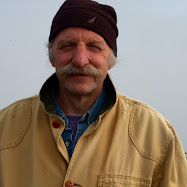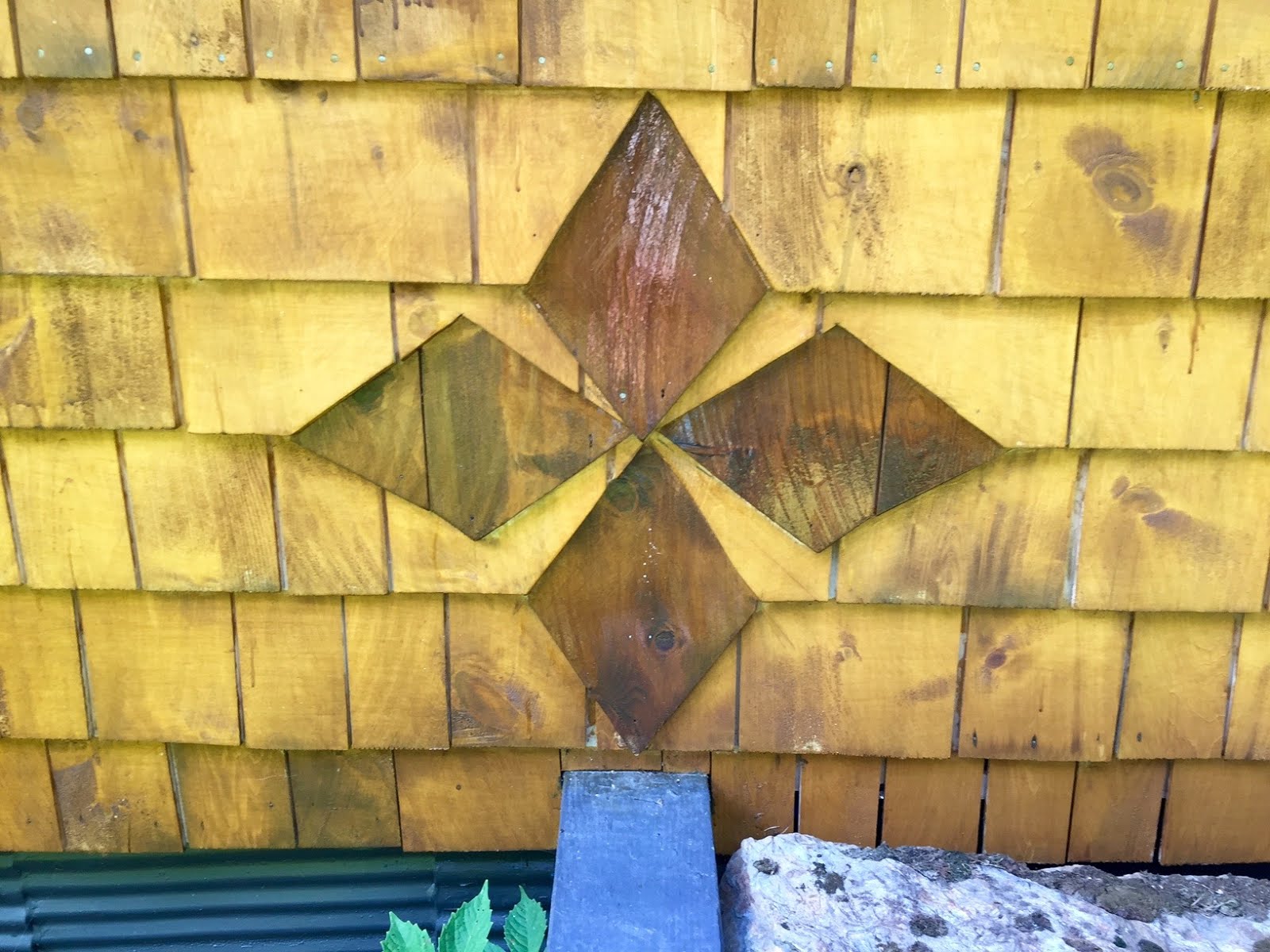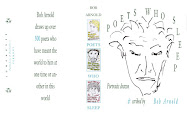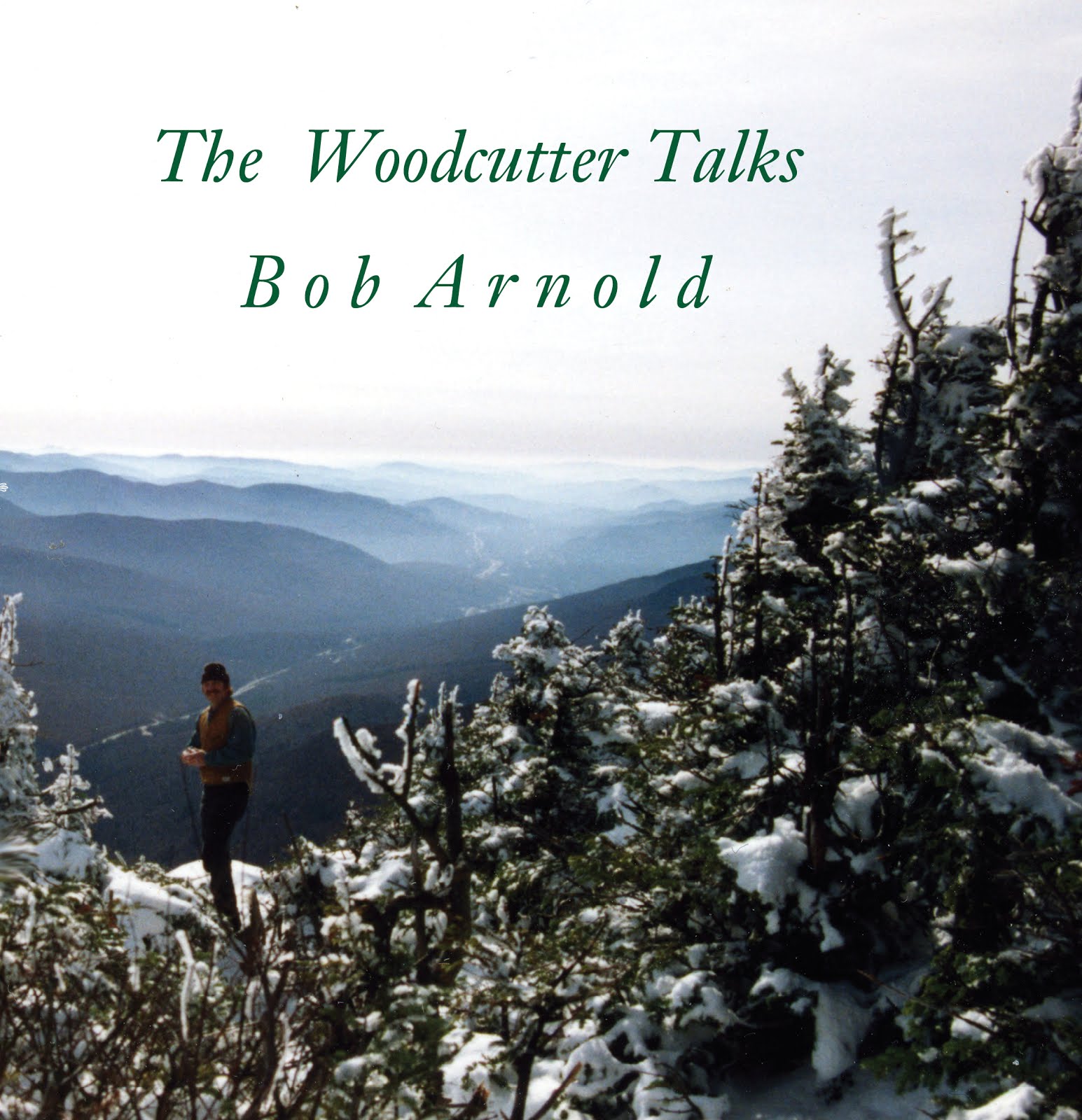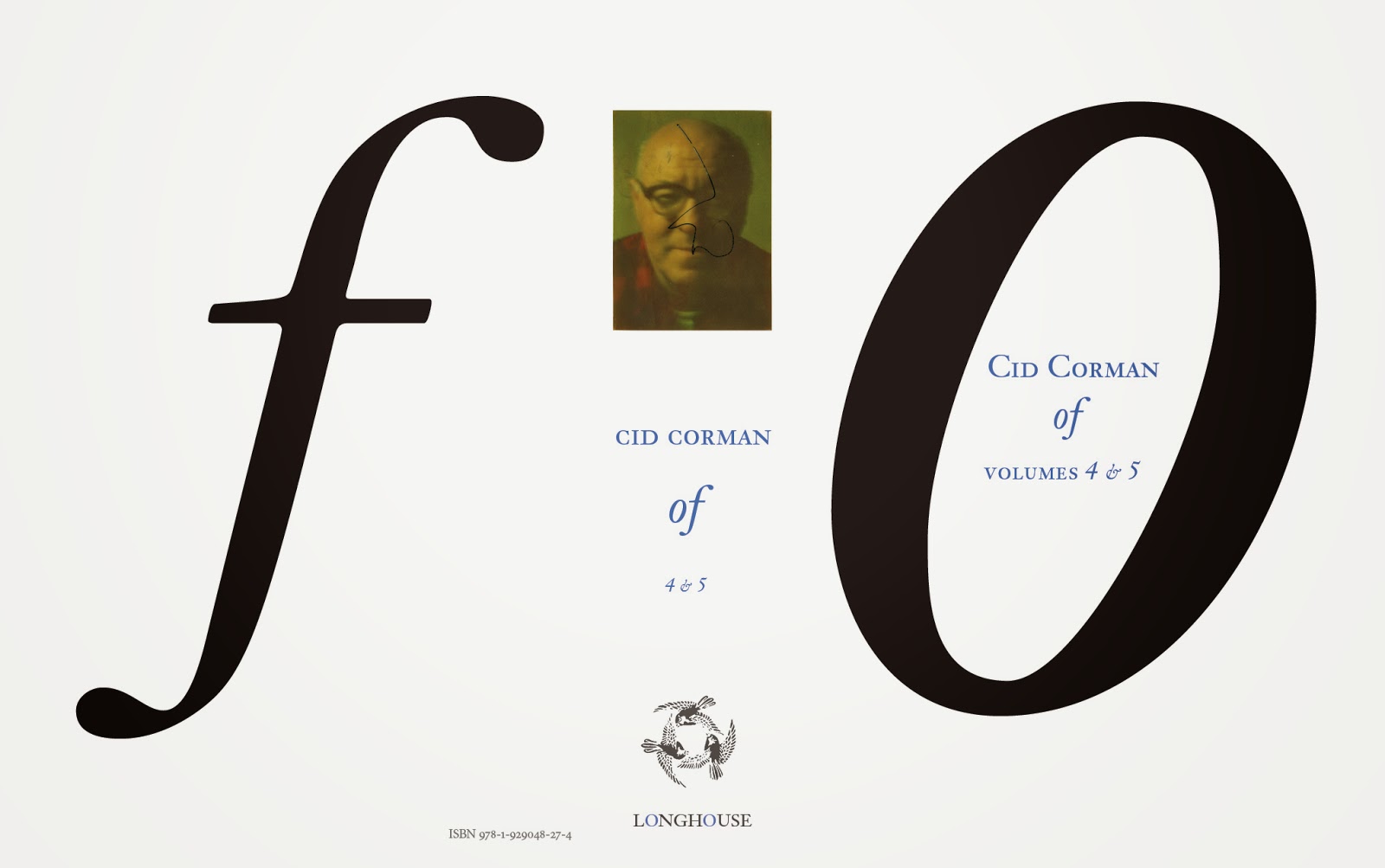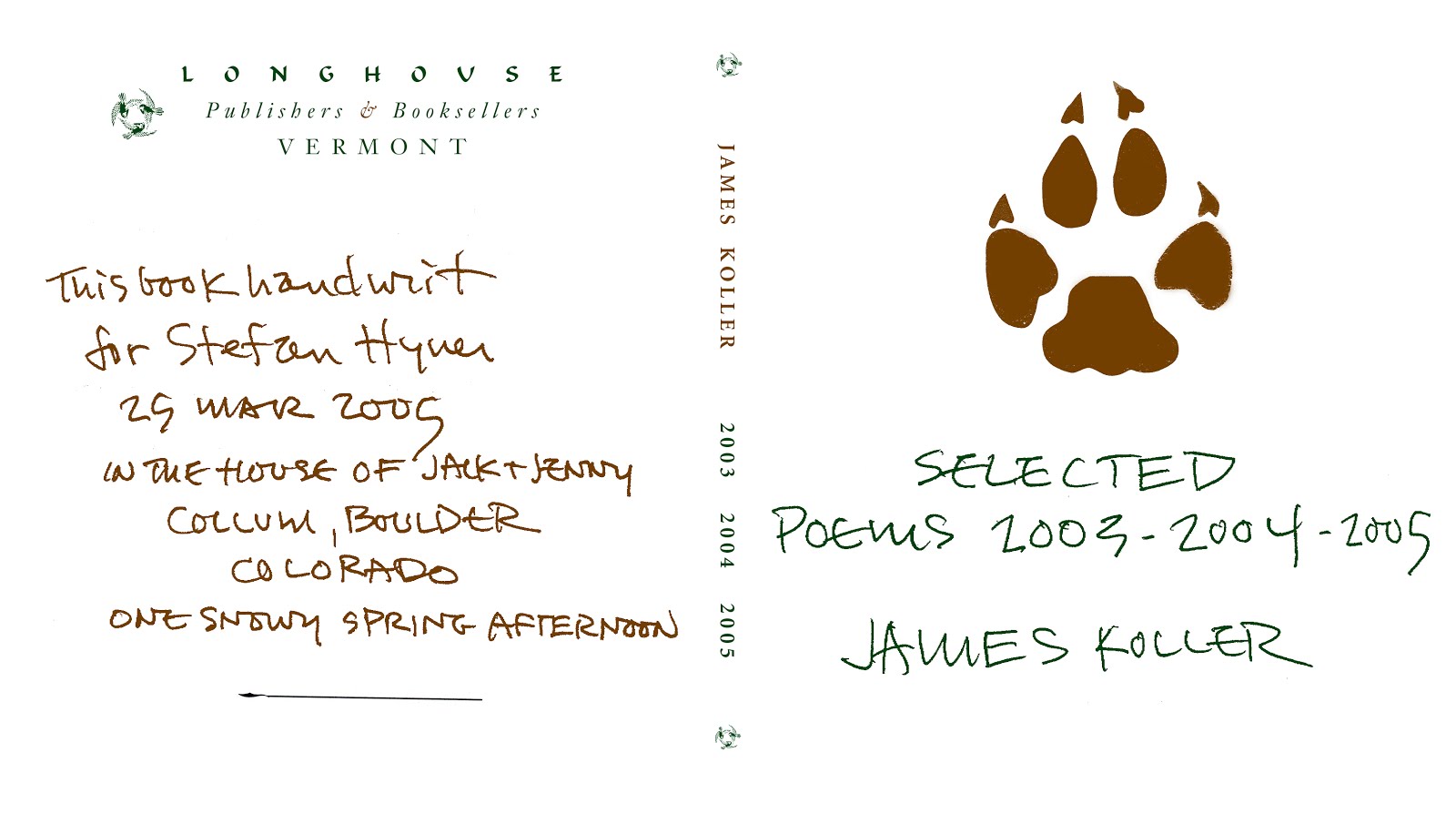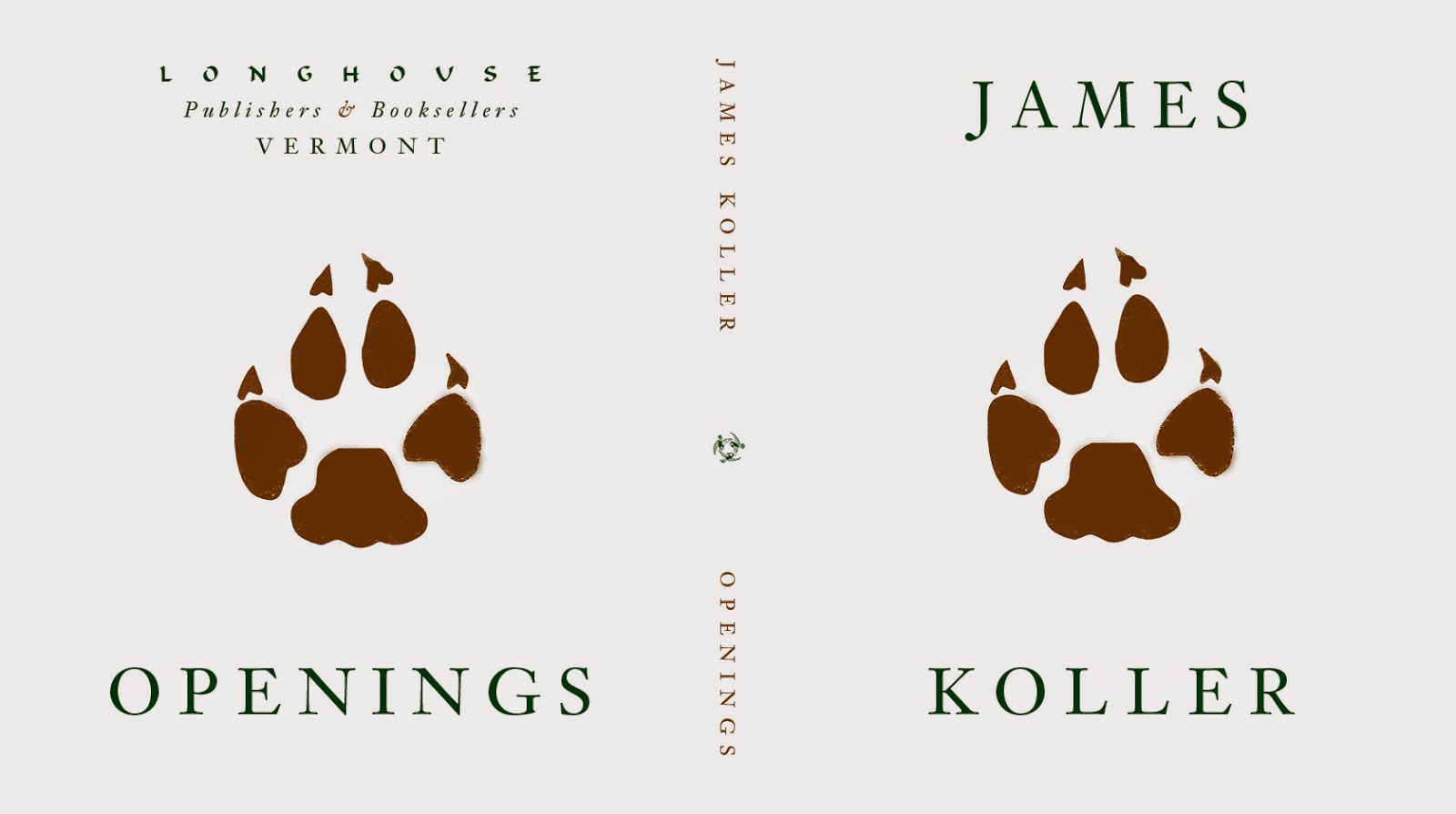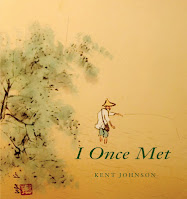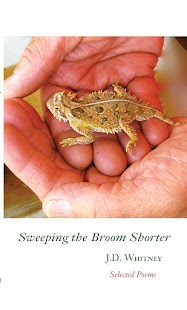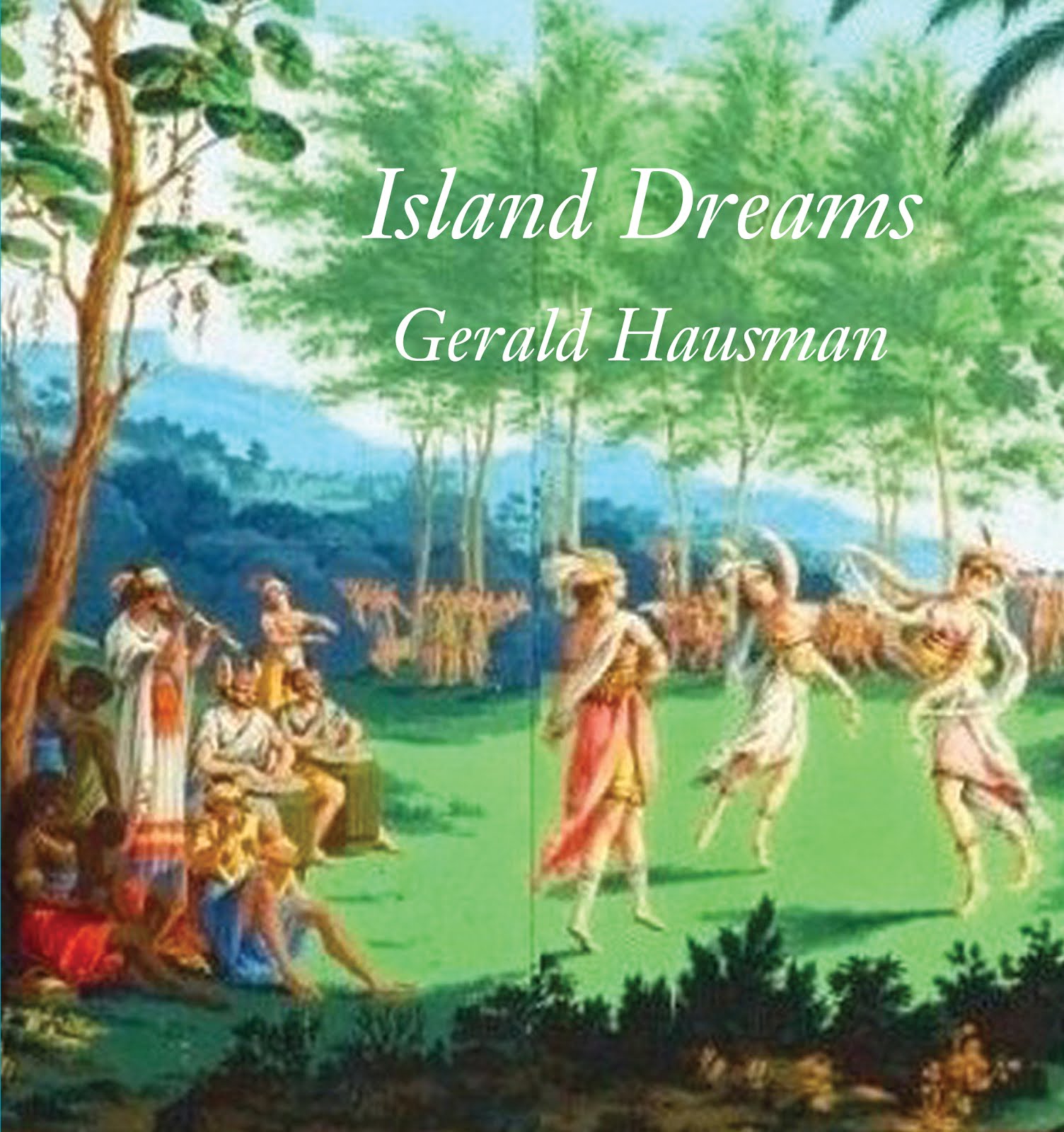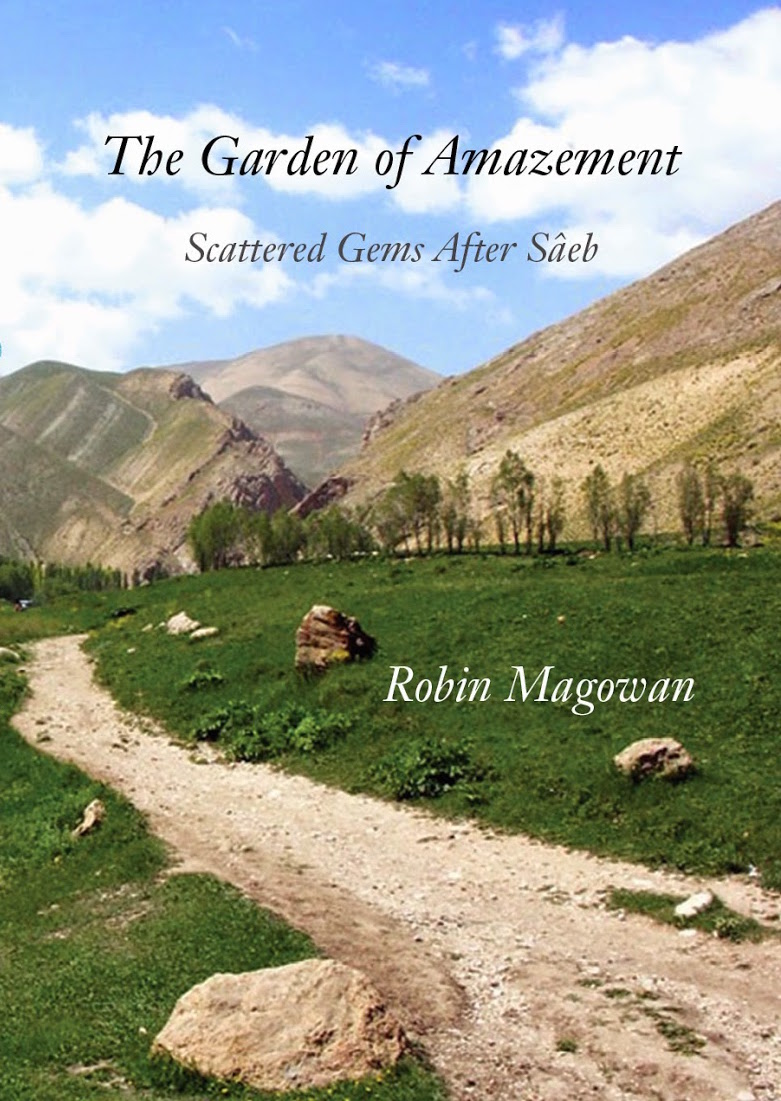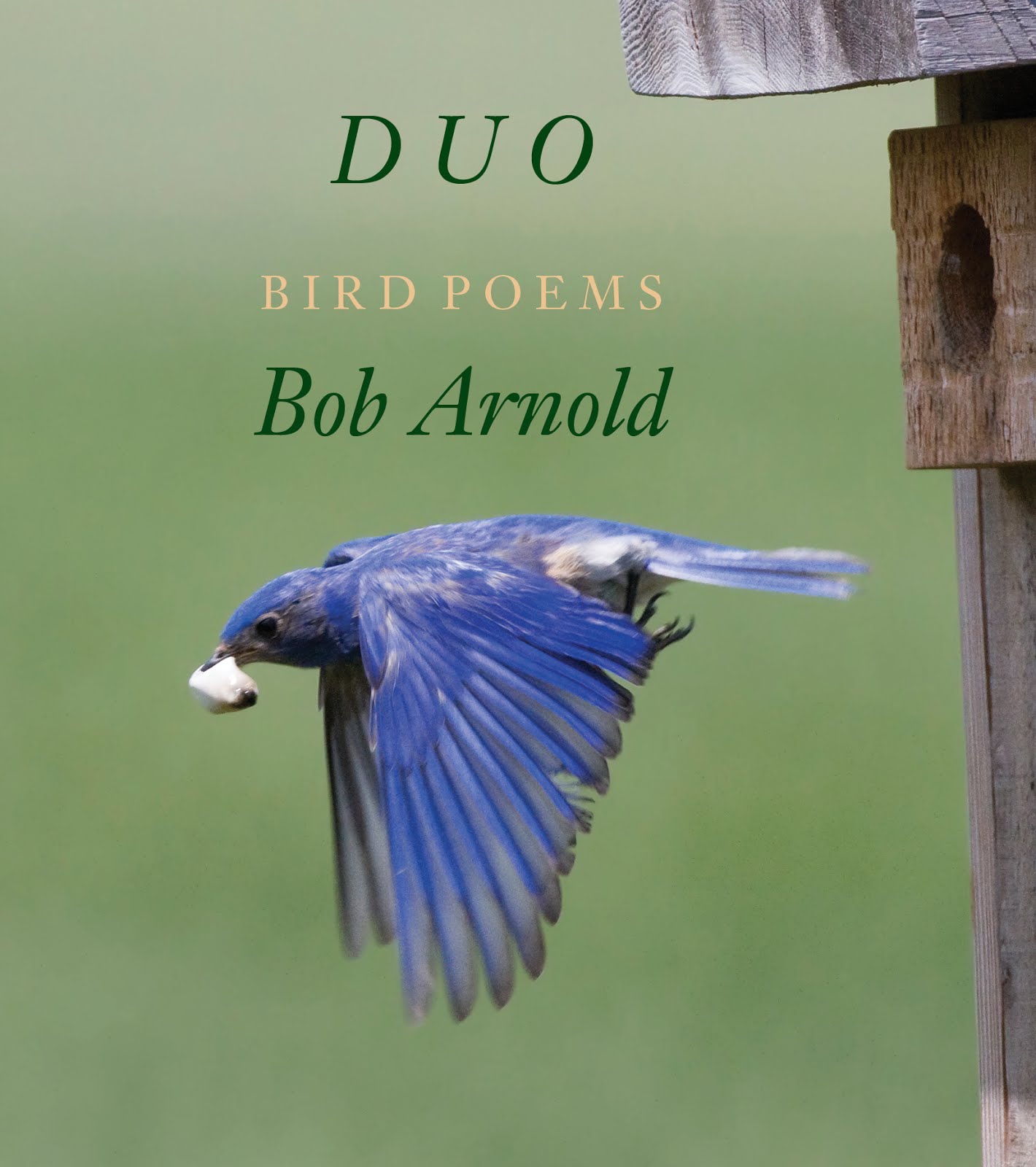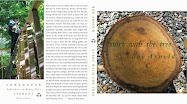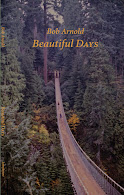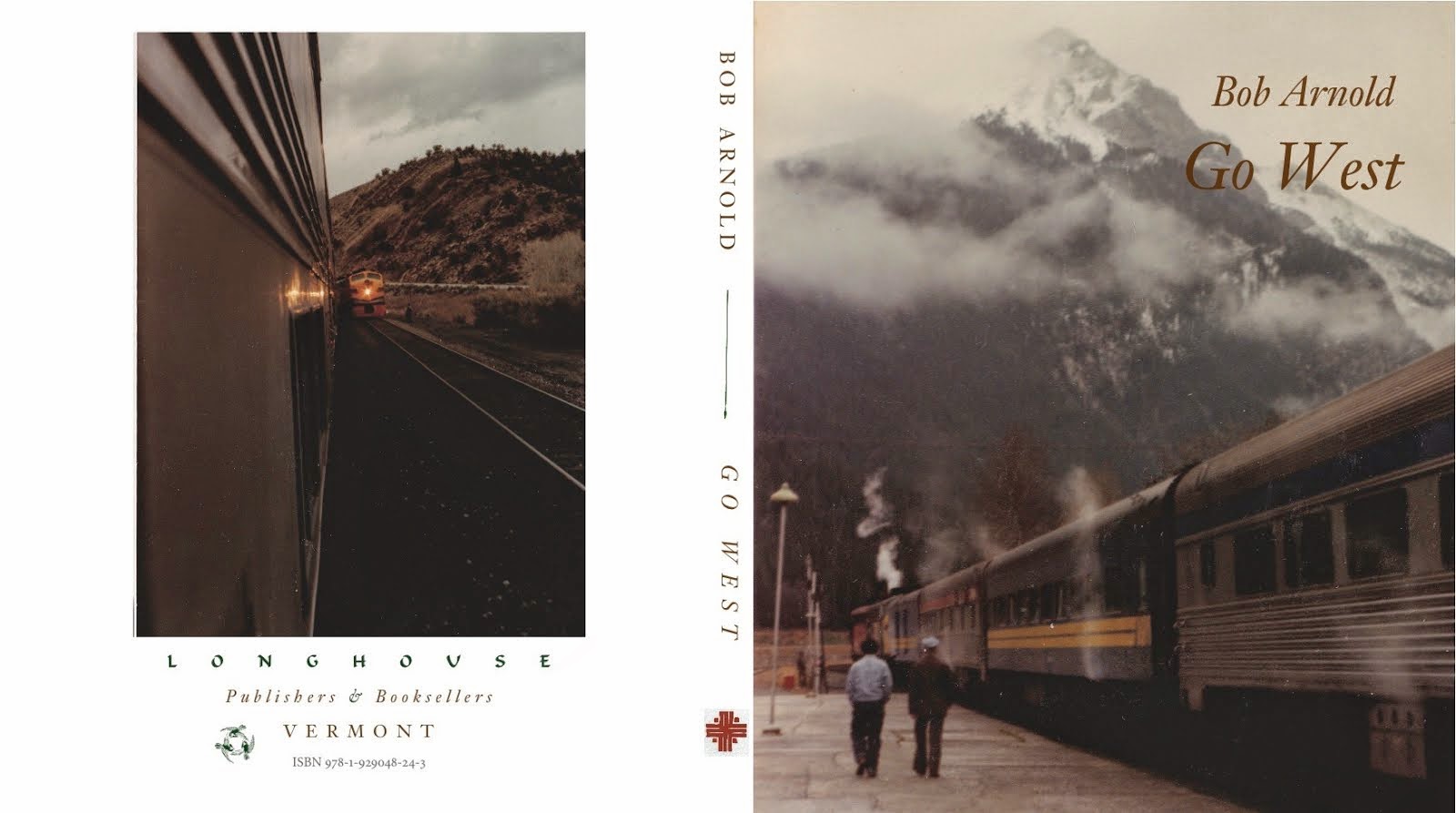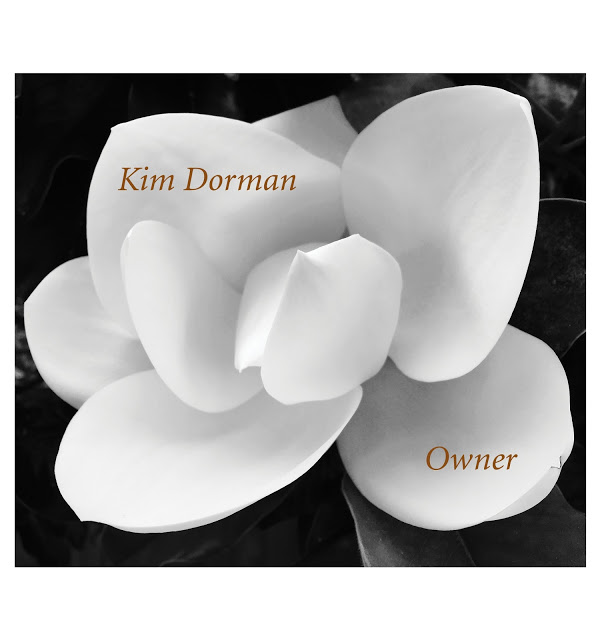
Saturday, February 28, 2009

Thursday, February 26, 2009

February 8, 2003
There are so many poets, so many poems.
They pour in from the Atlantic, through Chesapeake Bay,
up the James River to my home.
So they did up the Housatonic to the Williams River
and me in the Berkshire Hills.
When I lived in California,
there were poets and poems everywhere,
swept into Santa Barbara Bay, flooding the mesas.
There are poets and poems everywhere:
in the foothills of the Rockies, across the Great Plains,
on top of the Adirondacks. The Catskills hide them,
and the Hudson flushes them out,
they are everywhere praising our Earth home,
bringing words and joy to everyone!
We sing your praises, oh my planet,
great Milky Way, Cosmos among us.
Monday, February 23, 2009
GREGORY DUNNE ON CID CORMAN

Summing Up that Force of Goodness
Review by Gregory Dunne
The Next One Thousand Years, The Selected Poems of Cid Corman
Longhouse Publishers & Booksellers
A wonderful new selected edition of Cid Corman’s poetry and poetry translations, The Next One Thousand Years, has recently been brought out by Longhouse Press. The edition has benefited from the editorial work of Cid Corman’s long-time friend, the poet, Bob Arnold. It has also benefited from the editorial work of Ce Rosenow who initially approached Bob Arnold, the executor of Corman’s estate, about the possibility of putting together a selected. Without the shaping and deeply informed influence of these editors, we would not have this marvelously varied and thematically rich and coherent volume we have before us today. This selection brings together both previously published and unpublished Corman poems and translations. Both long-time readers of Corman’s work as well as first-time readers will draw sustenance and delight from this volume.
The American poet Cid Corman passed away in Kyoto, Japan on March, 2004 where he had lived for nearly fifty years. He was 79 years old. This selected edition is the first selection to appear since his death. Corman was a prolific poet and a prolific translator. During his lifetime, he produced nearly two hundred books. He was, quite simply, “one of the great poets of the modern era,” as Bob Arnold asserts in the his insightful and moving essay at the back of the book: The Man Who Always Was.
This volume is well-made and attractive. This is no mass produced paper back. It feels good in the hands. There is weight and heft to it. It is not too heavy nor too light. At 206 pages, it feels right. The book’s cover is graced with a beautiful color photograph of a mountain stairway leading up through a forest in Japan. The paper used in the construction of the book is thick and creamy. It feels good to the touch. Each poem is given ample space on the page to breath. There is no cramming of poems into the pages. Each poem is allotted a page – no matter how brief the poem. I mention all of this by way of acknowledging the attention to detail that the editors have paid to every aspect of the book’s construction. It is not just that the poems and translations have been carefully selected, but that the book itself has also been carefully and beautifully made. This attention to detail honors Corman’s own attention to detail in all things touching upon the poetic. Corman was, first and foremost, an artist, but he was an artist who had reverence for craftsmanship. He oversaw the production of many of his limited edition print books. And in this way, he produced many beautiful volumes. His magnus opus, of, printed and bound in Kyoto with cover art by his friend, the renowned artist Sam Francis, is perhaps one of he more outstanding examples of this kind of achievement. As a long time friend and publisher of Corman’s, Bob Arnold knows at a very close and intimately level what constitutes a well-made book in Corman’s eyes. Bob Arnold and Longhouse Press have delivered that book. Make no mistake, this volume has been put together with loving care by editors who are deeply knowledgeable of Corman’s poetry.
The book is not merely an object of physical beauty, it is a book that contains a world of rich, compassionate, and beautiful poetry. The task the editors had in attempting to distill a vast amount of poetry into a relatively slim collection must have been daunting. Corman was, as noted, a prolific poet and translator. His magnum opus, for example, of, is comprised of five volumes. Each volume is 750 pages in length. To date, three volumes have been published. Volume four and volume five have yet to be published. In addition to his own work, Corman has translated work from many languages, cultures, and time periods. He has, for example, translated from ancient Hebrew, Greek, Latin, Chinese, and Japanese. He has also translated from nineteenth and twentieth century French, Spanish, Italian, German, and other European and non-European languages. How could the editors effectively cull from this vast body of work and produce something like a representative sampling of Corman’s work, a selected? Bob Arnold gets to this concern in his essay at the back of the book when he writes: “I’d like to think we are not making as much a representative selection here, but a philosophical one practicing the less is more and at the same time presenting the highest quality of Cid’s poetry summing up that force of goodness.” Even with all that is left out, this book includes a stunning collection of new and old Corman poetry as well as translations, both new and old, from poets such as Basho, Tu Fu, Li Po, Ryokan, Issa, Rilke, Ungaretti, Montale, Char, Hosai, Holan, Celan, Sengai, Santoka, Denis, Shiki, Cohen, and the list goes on. Amazingly, despite these many diverse sources, the book reads as being all of a piece. Corman’s life and his affections when lovingly and intelligently discerned through the shaping hands of his poet friends the editors Bob Arnold and Ce Rosenow becomes a coherent whole – a poetic world that is everywhere teeming with vitality.
One way in which that “force of goodness” Bob Arnold speaks of is felt is in the way that the selection is made to read very much like a Corman edited book, and in particular the way in which this book reads like Corman’s magnum opus of. One of the most distinguishing features of the first volume of of is the manner in which Corman incorporates translations alongside of his own poetry to create a sweeping sense of poetry through time and human history. With this gesture, Corman says poetry is central to human life and we are “of” this stuff. He brings translated ancient poetry up out of the past and places it beside his own. In the opening pages of his five-volume book of, Corman lays out quite explicitly what his intentions are in assembling such a book and in titling it of:
for those who find themselves here
and sounding the words care to be
this is a book of a life as exacting as any
other, not in chronological order, but
through as for all time: a small proportion of
what has occurred to me and to which the work
unseen is complementary
the title reflects a precisely physical metaphysics:
the meta the indissoluble unfathomable fact: the
genitive case: to which we are all beholden and
within which we remain hopelessly particular
and to the extent that a poetry can, these poems
articulate it - which humbly (meaning - aware
of there being no choice) reveals transparently,
whatever else may be felt, I trust (trust implying
you), wonder, gratitude, pain, and love.
“This is a book of a life,” Corman asserts, but read on and we get “but / through as for all time:” We need to take Corman at his word here “for all” and “time.” And understand and appreciate how Corman understands his life, as well as his work, as being both a part of something else and at the same time “hopelessly particular:” In speaking of the title of the book, of, he remarks in the following way: “The title reflects a precisely physical metaphysics: / the meta the indissoluble unfathomable fact: the genitive case: to which we are all beholden and within which we remain hopelessly particular.” Going on, Corman tells us that to the extent a poetry can, “these poems articulate” this indissoluble unfathomable fact of our being both a part and separate. To my understanding then, this selection of poetry, The Next One Thousand Years, reads in such a way as to honor precisely what Corman is laying down above, and to the degree it does achieve this, the selection is at once true and grounded in Corman’s poetics while branching out from it, providing us with this further articulation, this further elaboration – a new text.
Bob Arnold said he wanted to present “the highest quality of Cid’s poetry summing up that force of goodness.” Goodness, of course, is a relative term, and there are many ways to understand and take the term. I would propose that one way in which “goodness” can be felt in Corman’s work and in particularly in this selection is found in the generosity of spirit we find within the poetry. Here is a poetry that moves beyond difference in culture, time, language and much else to assert a connection between us all – between the human and the non-human, between the past and future, between the living and the dead. Corman’s poetic world embraces that connection in a most loving and compassionate way. And as one encounters poem after poem, there is a “summing” (summoning?) of that goodness. I believe that this selection brings that aspect of Corman’s work forward to us and for that we should be grateful. I would like to quote several pages below in order to give a sense of how this selected volume is working. I have selected four poems below. They come from pages 23, 24, 25 and 26 respectively. One poem to a page. The reader will note that Corman’s own poems are woven right in between his translations of other poets. Three poets are represented here and yet what a brotherhood they evidence – despite Corman’s own separation in time and place – in culture and language – how similar is the song of poetry they sing? As a poet, Corman understands poetry tells us we are family. The other poets are the Japanese poets Issa (1763-1827) and Ryokan (1758- 1831):
The father
cuts the wood –
the child’s truck
stands waiting
Corman
*
The snow is melting
The village is brimming with
All at once children.
Issa
*
Father and son
at night on a slope
resting against hay
gazed upon by stars
finding the needle
breath of their breath.
Corman
*
Children in groups with
their hands in one another’s
in the fields of spring
in gathering tender greens
happy as happy can be.
Ryokan
In sum, this is a wonderful condensed volume of some of Cid Corman’s best poetry and best work in translation that has been brought across and shaped into an integrated cohesive whole by editors who have long and deep relationship with the writer. In this sense, it is at once an authoritative selected as much as it is a judicious one. It honors Corman in being true to what at core informed his poetic world. It celebrates Corman and his work and makes his work readily accessible in one volume. It is hoped that many new readers will find their way into the large and vital world of Corman’s poetry through this volume – a slim volume and yet a comprehensively complete volume in so far as it succeeds in giving the reader a felt sense of the overall “goodness” of Corman’s work. The book’s cover shows us a beautiful mountain stairway leading up into a verdant Cedar forest – a fitting image of invitation for those readers wishing to enter a poetic world that is much like a forest in what its speaks of the past and of the future – in it what it offers
To our lives, to our breathing, to our breath:
The Rite
To say sky
as one says
water. To
pour it in-
to a cup
and hold it
at the lips
and drink. Of
it. And at
sundown to
drink it a-
gain as wine.
This title and other Cid Corman books are available at the following address: http://www.longhousepoetry.com/corman.html
Gregory Dunne is a scholar living in Japan. He was a friend of Cid Corman’s. Two parts of a memoir of Cid Corman by Dunne appeared in issues 3 and 4 of the PRRB.
Saturday, February 21, 2009
ANNE WALDMAN

its aspen leaves turn yellow
the tray is the mesa
the hurricane is relentless
the masters are exposed
Wednesday, February 18, 2009
GERALD HAUSMAN

TEMPORARILY
I stuffed Phil’s pockets
with tens and twenties once
money my students
gave to me to give to him
after he read
Sourdough Mt Lookout
later we ate lunch
Phil’s white shirt
covered with red chile spots
“Seems I can’t eat without
getting it on myself,”
he said mopping his plate
with a sopaipilla
Phil said Jack said,
“One day we’ll all be old
railroad bums
together under the bridge
drinking bottles of Tokay wine.”
I told him
La Llorona
lived under the bridge.
“Who’s that?”
“The woman with no face.”
“Ah,” Phil said, squinting
“That building over there
is either a publisher or
a whorehouse, so many people
coming and going.”
“My publisher,” I said.
He laughed, “Good for you.”
When I dropped him off
At the zendo, we hugged
I asked when I’d see him again
“You know
I’m only here” – he paused --
Sun gleam on blue sage
“temporarily.”
Monday, February 16, 2009
BOB ARNOLD

EDGE OF LAND
What overtakes me more —
The blue of the sea or her dress
Raised, wading, high above her knees
THE WOODCUTTER TALKS
Long before the great ships at sea
There were the deep inland forests
I stand in one today knee-deep in snow
10 degrees with a wind
My saw shut-down
Oil freeze to bar and gloves
Listening awhile to the ships at sea
The long groaning waves
High high
Above me
FLOATING WORLD
It was a dreamy time for you and me
The weather said so
The pair of windows that opened like shutters
The easy turn of the latch
Through the opening light dazzled
Something like your hair
Many years married I loved you like
A young girl from behind
A small bird with flashing orange wings
Sang from a tree that grew to our window
In this hut we built with our own hands
Some would call it a fairytale
These days pass by as light becomes darkness
There is next to nothing to show for it
SLY
By truck we were
Heading home the same
Time we saw fox heading
Home by the side of the road
Muddy legs like quick
Moving boots he made
His way and I swear
We looked at him
And he looked at us
And the Earth was whole
Sunday, February 15, 2009


Alec Finlay once visited us at Longhouse many years ago with his satchel of good books, hand chosen music, a few warm clothes, and slide show of his father - Ian Hamilton Finlay's life and work from pastoral Scotland. It was about a week of family meals, visits with a few poets, ice-skating on our pond, sledding, and a Super Bowl game. AF went on to cross America visiting others. What we are sharing here is a sample of AFs hand-stamp poems available from Longhouse.
Friday, February 13, 2009

Since 1971 I have been logging book, music, film reviews and rural-to-town commentary from Woodburners We Recommend. Susan tells me my chief readers are folks lost a moment looking for more information about their woodstoves. Sorry. The ‘Burners continues on another part of the Longhouse website. Woodburners On-Fire! will be a more concise overview — as if you have stopped on our back road and asked for instructions on how to get out, and instead I speak to you one of these reviews. Go well.
remembering
KEITH WILSON
MAX NEUHAUS
DEWEY MARTIN
~
 KEYNOTE ADDRESS / POETS
KEYNOTE ADDRESS / POETSAmiri Baraka, Ed Dorn & the Western World
Skanky Possum & Effing Press www.effingpress.com
Effing Press 703 W. 11th St. Austin, Texas 78701
freewheelin' reflections delivered in 2008 at the Ed Dorn Sympoium in Boulder, Colorado, covering Dorn as well as Baraka as well as USA small press histories. One to own.
 POETRY
POETRYDavid Giannini, Az Two
Adastra Press 16 Reservation Road Easthampton, Ma. 01027-1227
Az in two together, Az in a continuation of a longer work, Az in Arizona for some days the poet's eyes wide open, accepting, giving back in return minded "no time unshadowed".
 POETRY
POETRYGeorge Bowering, Vermeer's Light
Talonbooks P.O. Box 2076 Vancouver , B.C. Canada V6B 3S3 www.talonbooks.com
with Bowering, as with Simon Pettet further down this list of fired-up books, poetry is a total recall of language meets anarchy meets craft meets deep pleasures page by page. You get in a car and it heads down a road or over a cliff, and all survive.


ART / POETRY
Jason Clark, Driven-Out, Ditched & Deserted
Coracle Ballybeg, Grange, Clonmel Tipperary, Ireland www.coracle. ie
including a poem by Cralan Kelder, tucked into this field notebook of junkyard sketches by Jason Clark, uniquely possessed and perfectly chosen by a press that has a knack for locating such beauties. Full blossom art.
 POETRY
POETRYJohn Martone 1031 10th Street Charleston, IL. 61920
just two examples of recent handmade and often hand-written foldup clutches of new poems from the gardener of Illinois.

AN UNFORGETTABLE
M.F. K. Fisher, A Cordiall Water
North Point Press
a gem stone to slip into the back pocket the way books used to be respected — from the chef of all living is meant to embrace in wholesome chapters, recipies and endurable musings. A favorite re-reader.


POETRY / DISC / PDF FORMAT
Edward Sanders, America, a history in Verse
Blake Route Press PO Box 729 Woodstock, N.Y. 12498 www.Americanhistoryinverse.com
brand new and loaded for bear — covering the last century by a participant, survivor, and one tackling the next century without losing a step. Here are the five volumes from Black Sparrow, over 2000 pages in length, covering 1900-2000 for your computer viewing silver screen.
 POETRY
POETRYSimon Pettet, Hearth
Talisman House PO Box 3157 Jersey City, NJ. 07303-3157
gorgeous no-holds-bar poetry defying a school, a place, or the usual quibbles of poetry wars & complaints — Simon comes to play. A new & selected poems attempting to span quite a lifetime. Enjoy yourselves.
 MUSIC / CD
MUSIC / CDRamblin' Jack Elliott, I Stand Alone
Anti, 2006
in the tradition of picking up the guitar and nicely finger-pickin' a tune, Elliott remains the best of the talkin' blues cowboy masters. There's as much Lenny Bruce as Woody Guthrie and they're both long gone — in body, but not spirit — and Ramblin' Jack Elliott isn't.
 POETRY
POETRYPatricia Smith, Blood Dazzler
Coffee House Press 27 North Fourth Street Suite 400 Minneapolis, MN. 55401 www.coffeehousepress.org
in a bookstore go to page 8 and read "Only Everything I Own" and decide then and there to buy this book — between Spike Lee's film "When the Levees Broke" and "Blood Dazzler" you hold the scoop on Katrina, who owns you (and they do), and what's to be done.
 POETRY
POETRYLisa Jarnot, Night Scenes
Flood Editions www.floodeditions.com
restraint right where you wish it, letting-go where most don't/can't, a poetry that rides the range of rhyme, no rhyme, song-fest, sudden hollow. Why not be fascinated.
 FARM LIFE / ARCHITECTURE
FARM LIFE / ARCHITECTUREThomas Durant Visser, Field Guide to New England Barns and Farm Buildings
University Press of New England One Court St. Lebanon, NH 03766 www.upne.com
an excellent survey in crisp black & white photographs of exterior and interior magnificence and small pegged details from grand hay barn to corn crib to cranberry bog shanty to outhouse. No stone left unturned, no cows in the way, and the author's name is strong lined old vintage New England.
Dat's..... Dat...... 4....... Now........
Wednesday, February 11, 2009
KIM DORMAN
rhy-
thm
sto-
len
frm
rainSome of Kim Dorman's axis of poetry are drawn from his life and work in India and his native region of the southwest, Oklahoma as a boy and Texas to this day. He has published small booklets from Longhouse and continues to issue monthly in grand paper copy circulated by a postal carrier his Gleanings of poetry, commentary, reverence, and gift.
Sunday, February 8, 2009
STEPHEN LEWANDOWSKI

MEETING THE BEAR
At night
bears flow
like some dark
force
through the trees
they turn logs
and stones
to lick up food
their thick fur
absorbs starlight
to become bear-shaped
black holes
One slips down from
a weedy road bank
and without a look
enters the field
illuminated by my car
soaking up
every ounce of light-
for a moment
there is no car
no driver
no time
no road
no bear
now we breathe
deep and travel on

Hang onto and buy those thin wafer poetry books.
KEITH WILSON

EVENSONG
It is evening again.
My son and his son
sit on the patio, a breeze
catches my grandson's blonde hair,
his father's darkly intense face
leans over his seven-year-old tranquility.
I, a shadow, soon to vanish
watch, hear their voices
as water flowing over
mountain stones or light
caught just before dusk
by surprise, all is held
here in the closing darkness.
— for Kevin & Jeremiah
Saturday, February 7, 2009
HOA NGUYEN

LIVING
Living in the dream under a US regime
that legalized and actively encouraged
random racism
---------I was the outspoken
sister------------defiant and scared
in the parking garage
talking back to the racist aggro frat boy
How to make dream-jelly when birds
love them-------We name birds
----------------------------Kingfisher
all trilly
---------a beefy kind of bird
Life eats life--------------Here's a fig
Wheeling black vultures collect now in the elm
frosted black wings
My 3-faced goddess nests in the roots
a fruit for child birth
(I wrote child bird originally)
and think
he will go far-------------being male & white-looking & attractive
Gather leaves and dry them Sew them
with reed string
------------------for to make me a book
A story within a story
-------Tree-roots mirror branches----or veins
-----------like a placenta
Rowan's bitter berries sweeten after frost
Wednesday, February 4, 2009
LAL DED
(b. 1320, Kashmir)

translated by Andrew Schelling
You are the earth, the sky,
the air, the day, the night.
You are the grain
the sandalwood paste
the water, flowers, and all else.
What could I possibly bring
as an offering?
Solitary, I roamed the extent of Space,
leaving calculation behind.
The place of the hidden Self
opened and suddenly
out of the filth
bloomed a lotus.
O Blue-Throated God
I have the same six constituents as you,
yet separate from you
I’m miserable.
Here’s the difference—
you have mastered the six
I’ve been robbed by them.
* The six kancukas, “husks” or “coverings” of existence in Kashmir Saivism: appearance, form, time, knowledge, passion, fate.This selection, from a booklet published by Longhouse, is just short of a dozen translated poems that suggest a deep allegiance to the Kashmiri form of Siva worship, as worked up by Andrew Schelling from a much longer and life enforcing work. Poet, translator and teacher Andrew Schelling has for years been a pivoting influence and friend to many from the halls of montezuma Naropa Institute of Boulder Colorado.© 2009 by Andrew Schelling & Longhouse Publishers
Monday, February 2, 2009
MICHAEL MAURI
NOTE TO SELF
(South Deerfield, North Amherst)
Note to self: next year don’t split so much of the firewood into small pieces; leave more big chunks for a longer burn. Otherwise the day is too hectic, spent running up and down the stairs to stoke the fire.
Also, make sure to cut all the wood 15 inches or less. 16’s don’t fit in the stove. 15 and a half is the max. You knew that but you messed up anyway. Now you have to get out your saw and cut a bunch of pieces a second time.
End of January. World Economic Forum in Davos, Switzerland. Global leaders trying to explain where they went wrong, who messed up. What happened to the Grand Celebration? Even the rich got fooled this time, letting Wall Street paper-pushers fritter away their wealth, all the while siphoning off regal fees and stunning bonuses. Of course, the rich are still rich, and the poor are still poor, and everyone else is still in between. We’re all in this together, it’s just that we’re all worse-off at being whatever we are.
I’m thinking that what I have here is an Off-Davos Un-Economic Forum, of sorts, in South Deerfield, Massachusetts, with just myself in attendance, and I’m looking at my woodpile. It appears the woodpile might last the next two months. But, then again, it might not, either. So, if not, ⎯ note to self ⎯ be ready to bring in more wood next year. More than just three cords.
Today I’m making a chocolate layer cake. Why? It was on the cover of a magazine in the dentist’s office, on glossy paper in rich, sumptuous detail. I saw it; and, ogling the lush, image, I decided I’d try it. But, let’s face it, this is not really a cake, this is insanity. So much butter, so much sugar; so much heavy cream, even cream cheese! On the platter, the cake weighs about 15 pounds. But, oh, the excited faces of my girls! That regular routine of bread- and pie-making has kept me in the dark about the excesses of layer cakes. Home-making’s questionable side. But it’s too late now. Must go forward. Must eat.
Nonetheless, after we each eat a piece, and then another, we cut the rest of the cake into three chunks. Give two away to friends with kids. Keep one for tomorrow.
And now I know: beware of Family Circle magazine. It could lead you astray.
A death notice is taped above my computer. A young guy, just 31 years old. Ten years ago he was the crack young mechanic fixing my chain saws down in the basement of Streeter’s General Store. But then he got a job with the railroad, a good job. And now this. The newspaper mentions that people can donate to juvenile diabetes. The poor dad. I know him. A great guy, too, like his son was. What’s he going to do now?
True, my work involves cutting trees, yet I felt like weeping when I saw the great, old beech tree in front of the North Amherst library. All the branches had been cut off, amputated on all sides! Just the bare stem was still standing. While driving home from a day’s work, I saw it, standing naked in the cold air, darkness settling in, crescent moon already out.
We all know the economy is in free fall. No one is saying it isn’t. Not anymore, anyway. It had to happen. We’ll see what kind of economy comes next. Maybe a new economy that doesn’t wear down the world, dig it up and incinerate it, drop bombs on it, dig huge graves for people, ruin all the places. But that’s still pie in the sky. Right now everyone just wants to patch up the old one, hoist it back up, shine it up a little and get it back on its feet so everyone can start speNNNding again. Buying STUFF.
Someday, maybe, our insignificant micro-decision to raise laying-hens in the backyard will prove provident. Maybe it won’t seem so odd in this American neighborhood setting where maintaining mow-able lawns is a top priority, where status is measured in lack of productivity. Our chickens, our multi-colored feathered folk, a little noisy at times, a little smelly, too, often comical, livening up the yard and bringing joy to one and all. Except when they disturb the neighbors.
It’s just half a dozen hens. Various breeds. We provide for them and they provide for us. Every day now they give us one or two eggs, sometimes three.
Fresh eggs; different shades of brown in your hand as you walk back across the snow, sometimes still warm, to show the girls.
1/30/2009

© 2009 by Michael Mauri & Longhouse Publishers







